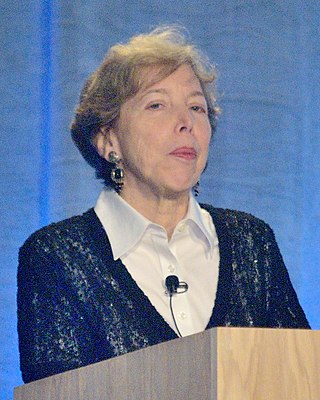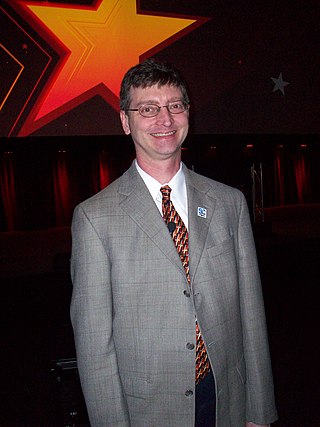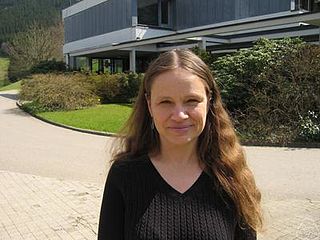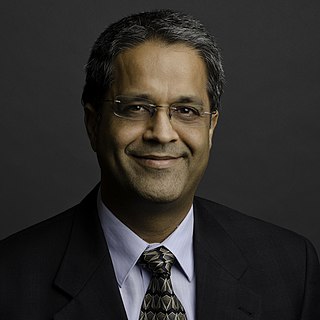
Jack Joseph Dongarra is an American computer scientist and mathematician. He is the American University Distinguished Professor of Computer Science in the Electrical Engineering and Computer Science Department at the University of Tennessee. He holds the position of a Distinguished Research Staff member in the Computer Science and Mathematics Division at Oak Ridge National Laboratory, Turing Fellowship in the School of Mathematics at the University of Manchester, and is an adjunct professor and teacher in the Computer Science Department at Rice University. He served as a faculty fellow at the Texas A&M University Institute for Advanced Study (2014–2018). Dongarra is the founding director of the Innovative Computing Laboratory at the University of Tennessee. He was the recipient of the Turing Award in 2021.

David A. Bader is a Distinguished Professor and Director of the Institute for Data Science at the New Jersey Institute of Technology. Previously, he served as the Chair of the Georgia Institute of Technology School of Computational Science & Engineering, where he was also a founding professor, and the executive director of High-Performance Computing at the Georgia Tech College of Computing. In 2007, he was named the first director of the Sony Toshiba IBM Center of Competence for the Cell Processor at Georgia Tech.

Susan Lois Graham is an American computer scientist. Graham is the Pehong Chen Distinguished Professor Emerita in the Computer Science Division of the Department of Electrical Engineering and Computer Sciences at the University of California, Berkeley.
Edward Seidel is an American academic administrator and scientist serving as the president of the University of Wyoming since July 1, 2020. He previously served as the Vice President for Economic Development and Innovation for the University of Illinois System, as well as a Founder Professor in the Department of Physics and a professor in the Department of Astronomy at the University of Illinois at Urbana-Champaign. He was the director of the National Center for Supercomputing Applications at Illinois from 2014 to 2017.
Charles Samuel Peskin is an American mathematician known for his work in the mathematical modeling of blood flow in the heart. Such calculations are useful in the design of artificial heart valves. From this work has emerged an original computational method for fluid-structure interaction that is now called the “immersed boundary method", which allows the coupling between deformable immersed structures and fluid flows to be handled in a computationally tractable way. With his students and colleagues, Peskin also has worked on mathematical models of such systems as the inner ear, arterial pulse, blood clotting, congenital heart disease, light adaptation in the retina, control of ovulation number, control of plasmid replication, molecular dynamics, and molecular motors.

William Douglas Gropp is the director of the National Center for Supercomputing Applications (NCSA) and the Thomas M. Siebel Chair in the Department of Computer Science at the University of Illinois at Urbana–Champaign. He is also the founding Director of the Parallel Computing Institute. Gropp helped to create the Message Passing Interface, also known as MPI, and the Portable, Extensible Toolkit for Scientific Computation, also known as PETSc.

Phillip Colella is an American applied mathematician and a member of the Applied Numerical Algorithms Group at the Lawrence Berkeley National Laboratory. He has also worked at Lawrence Livermore National Laboratory. He is known for his fundamental contributions in the development of mathematical methods and numerical tools used to solve partial differential equations, including high-resolution and adaptive mesh refinement schemes. Colella is a member of the US National Academy of Sciences.
The Sidney Fernbach Award established in 1992 by the IEEE Computer Society, in memory of Sidney Fernbach, one of the pioneers in the development and application of high performance computers for the solution of large computational problems as the Division Chief for the Computation Division at Lawrence Livermore Laboratory from the late 1950s through the 1970s. A certificate and $2,000 are awarded for outstanding contributions in the application of high performance computers using innovative approaches. The nomination deadline is 1 July each year.

Christopher Ray Johnson is an American computer scientist. He is a distinguished professor of computer science at the University of Utah, and founding director of the Scientific Computing and Imaging Institute (SCI). His research interests are in the areas of scientific computing and scientific visualization.
John B. Bell is an American mathematician and the Chief Scientist of the Computational Research Division at the Lawrence Berkeley National Laboratory. He has made contributions in the areas of finite difference methods, numerical methods for low Mach number flows, adaptive mesh refinement, interface tracking and parallel computing. He has also worked on the application of these numerical methods to problems from a broad range of fields, including combustion, shock physics, seismology, flow in porous media and astrophysics.

Bin Yu is a Chinese-American statistician. She is currently Chancellor's Professor in the Departments of Statistics and of Electrical Engineering & Computer Sciences at the University of California, Berkeley.

Alan Stuart Edelman is an American mathematician and computer scientist. He is a professor of applied mathematics at the Massachusetts Institute of Technology (MIT) and a Principal Investigator at the MIT Computer Science and Artificial Intelligence Laboratory (CSAIL) where he leads a group in applied computing. In 2004, he founded a business called Interactive Supercomputing which was later acquired by Microsoft. Edelman is a fellow of American Mathematical Society (AMS), Society for Industrial and Applied Mathematics (SIAM), Institute of Electrical and Electronics Engineers (IEEE), and Association for Computing Machinery (ACM), for his contributions in numerical linear algebra, computational science, parallel computing, and random matrix theory. He is one of the creators of the technical programming language Julia.

Katherine "Kathy" Anne Yelick, an American computer scientist, is the vice chancellor for research and the Robert S. Pepper Professor of Electrical Engineering and Computer Sciences at the University of California, Berkeley. She is also a faculty scientist at Lawrence Berkeley National Laboratory, where she was Associate Laboratory Director for Computing Sciences from 2010–2019.
Marsha J. Berger is an American computer scientist. Her areas of research include numerical analysis, computational fluid dynamics, and high-performance parallel computing. She is a Silver Professor (emeritus) of Computer Science and Mathematics in the Courant Institute of Mathematical Sciences of New York University. She is Group Leader of Modeling and Simulation in the Center for Computational Mathematics at the Flatiron Institute.

Linda Ruth Petzold is a professor of computer science and mechanical engineering at the University of California, Santa Barbara, where she is also listed as affiliated faculty in the department of mathematics. Her research concerns differential algebraic equations and the computer simulation of large real-world social and biological networks.

Inderjit S. Dhillon is the Gottesman Family Centennial Professor of Computer Science and Mathematics at the University of Texas at Austin, where he is also the Director of the ICES Center for Big Data Analytics. His main research interests are in machine learning, data analysis, parallel computing, network analysis, linear algebra and optimization.

Richard Vuduc is a tenured professor of computer science at the Georgia Institute of Technology. His research lab, The HPC Garage, studies high-performance computing, scientific computing, parallel algorithms, modeling, and engineering. He is a member of the Association for Computing Machinery (ACM). As of 2022, Vuduc serves as Vice President of the SIAM Activity Group on Supercomputing. He has co-authored over 200 articles in peer-reviewed journals and conferences.
Xiaoye Sherry Li is a researcher in numerical methods at the Lawrence Berkeley National Laboratory, where she works as a senior scientist. She is responsible there for the SuperLU package, a high-performance parallel system for solving sparse systems of linear equations by using their LU decomposition. At the Lawrence Berkeley National Laboratory, she heads the Scalable Solvers Group.
Laura Grigori is a French-Romanian applied mathematician and computer scientist known for her research on numerical linear algebra and communication-avoiding algorithms. She is a director of research for the French Institute for Research in Computer Science and Automation (INRIA) in Paris, and heads the "Alpines" scientific computing project jointly affiliated with INRIA and the Laboratoire Jacques-Louis Lions of Sorbonne University.

Yang You is an Presidential Young Professor at the National University of Singapore.













